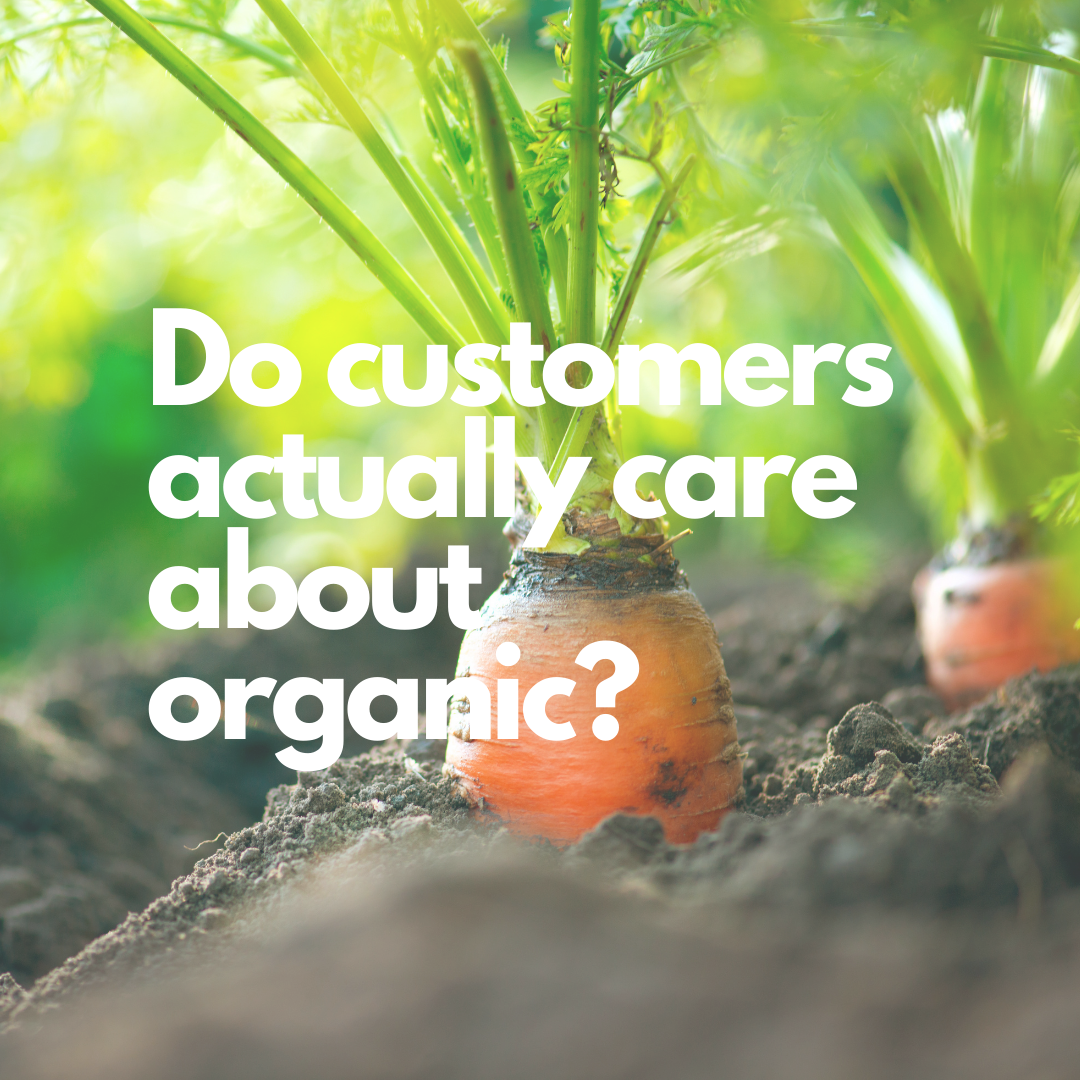Do you know that customers spend over £45 million on organic foods every week?
Foods free from pesticides, fertilisers, antibiotics and chemicals are popular with the general public at the moment…
.. Or are they?
Join us as we look at the past, present and future of organic produce; as well as customer demand and if restaurants should offer organic food on their menus.
The history of organic food
Many people think organic food is a recent development, but it’s something that has been around for much longer than you might initially think.
The pesticide Dichlorodiphenyltrichloroethane (also known as DDT) was created during World War II to help increase food yield and feed people after the war. It was not only found to kill insects and birds, but also cause potential health problems in humans.
DDT ended up being banned in the UK in 1986. However, before this time, people started looking into the alternatives to harmful chemicals and the health benefits of organic produce.
Food crises have also spurred the growth in demand for organic food over time. For example, the BSE crisis emerged in the 1990s due to farmers feeding infected meat to cattle. This lead to a surge in demand in organic, grain-fed meat.
Do customers want organic food?
There are different types of customers to take into consideration when it comes to organic produce.
Some customers are not interested in organic food at all. Some are curious about organic food and are researching the benefits. Some regularly buy organic products. Then some are very invested in organic food, as well as living an organic lifestyle.
One of the largest markets for organic foods is families, with four out of five parents saying they buy organic foods on a regular basis. Another critical demographic is people between the ages of 31 to 40.
The key reason behind people not being interested in organic food is the cost of it. In a time where many people are on a strict food budget, organic food is still a luxury they cannot afford. For example, organic bread costs 185% more than standard bread, whilst organic milk can have an 86% mark-up over non-organic alternatives.
2021, organic food trends and the impact of coronavirus
There are several reasons why some people have been moving to organically grown food over the past few years. These include:
The pandemic and lockdown
Lockdown has had an influence on the amount of organic food people have been purchasing. 35% of people have been buying more locally grown food in 2020, which is more likely to be organic. As people have not been able to go to pubs and restaurants, organic beer, wines and ciders have grown in popularity too.
This has led to some businesses reporting a 30 to 40 per cent increase in organic produce sales like fruit, vegetables, honey and dairy products. Experts predict that these behaviour changes will stick after lockdown.
Coronavirus has inspired people to take steps to improve their health, with organic foods being regarded as healthier and safer than their non-organic counterparts.
Brexit
Brexit is now in force, and this has had an influence on people buying local, organic produce too.
According to Barclays Bank, 63% of British people have said Brexit has inspired them to buy more home-grown fruit and vegetables in 2021.
A switch to healthier eating
More and more people are also looking to meat-free diets. The number of vegans in the UK is set to increase by 132% by the end of 2021.
Organic and vegan foods generally go hand in hand (although there is a lot of debate about this in the vegan community).
More choices and availability
The range of organic food has also grown over time, which has increased sales. Many years ago, the only organic produce available were fruit, vegetables, grains and meat. Now you can get organic produce including chocolate, honey and cheese.
People can even grow their own organic food themselves. The easiest way to do this is by renting an allotment or keeping a vegetable patch in the garden, but there are other options. According to Chickenguard, over five million chickens are being kept as pets in Britain!
Should I serve organic food in my restaurant?
Even though we are in lockdown, we are all thinking of ways to welcome both existing and new customers back when the hospitality industry opens up again.
If you run a restaurant, offering organic food can be a great way of retaining customers and bringing new ones through the doors – especially if you are working with local suppliers. However, organic food can be more expensive to purchase and may also have a shorter shelf life, so this is something you will need to factor into your budget.
Do bear in mind though that 65% of customers would be willing to pay an additional 10% in a restaurant for organic food, with 20% of people saying they’d pay more.
Customer research is vital. Speak to your customers and ask if they prefer to buy organic or non-organic food in their day-to-day lives. Once you have your findings, you can then start rolling out organic dishes, alongside an education programme explaining why organic food is a better choice.
Great places to start when it comes to offering organic foods are Buddha bowls, veggie burgers and grain-fed cuts of meats. Another option is to provide organic alcoholic tipples behind the bar.
Summary: organic or non-organic?
So, to answer the question asked at the start of the article, do customers care about organic food?
Interest in organic food is growing all of the time, but there is still a key demographic that will not buy because the food is too expensive or are not interested in the health benefits. Will attitudes change in the future? Only time will tell.
It’s great to see customers buying more and more organic food, but there is still a lot of confusion around the topic. For example, just because something is labelled as ‘fresh’ or ‘natural’, doesn’t necessarily mean it is organic. As mentioned previously, good education is essential.
References
- https://www.thebalancesmb.com/restaurants-go-organic-2538365
- https://www.thebalancesmb.com/who-buys-organic-food-different-types-of-consumers-2538042
- https://www.saladplate.com/blog/knowledge-creating-an-organic-restaurant-in-a-non-organic-world/
- https://smallbiztrends.com/2018/06/local-organic-produce-is-good-for-restaurants.html
- https://www.uren.com/news/2021-organic-food-trends
- https://www.forbes.com/sites/alexledsom/2019/02/16/new-report-uk-consumers-want-more-organic-everything/
- https://www.foodnavigator.com/Article/2020/05/06/Organic-food-gets-coronavirus-boost
- https://greengroundswell.com/organic-food-history/2014/02/03/
- https://www.foodnavigator.com/Article/2016/01/28/UK-shoppers-pay-89-more-for-organic-food-survey
- https://www.agriland.co.uk/farming-news/report-63-of-british-people-will-buy-more-uk-produce-as-a-result-of-covid-19-and-brexit/

